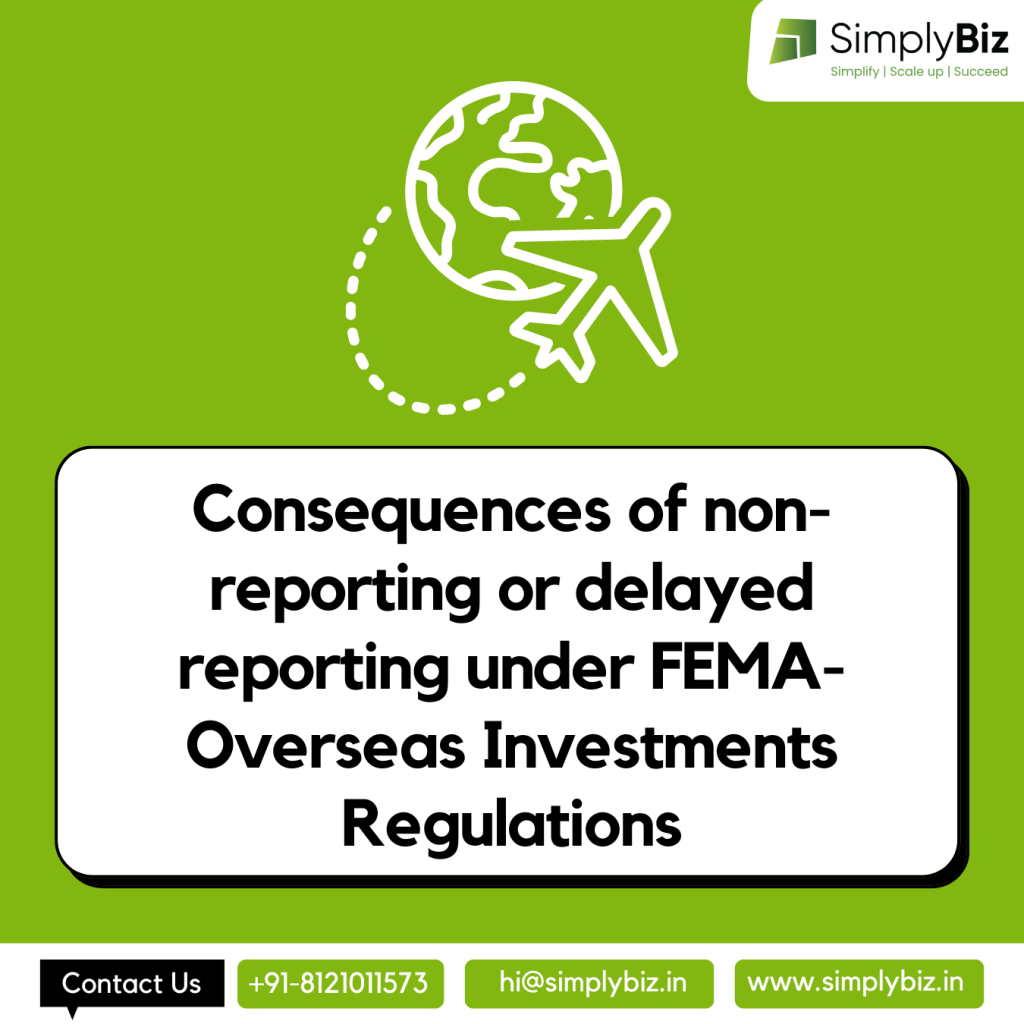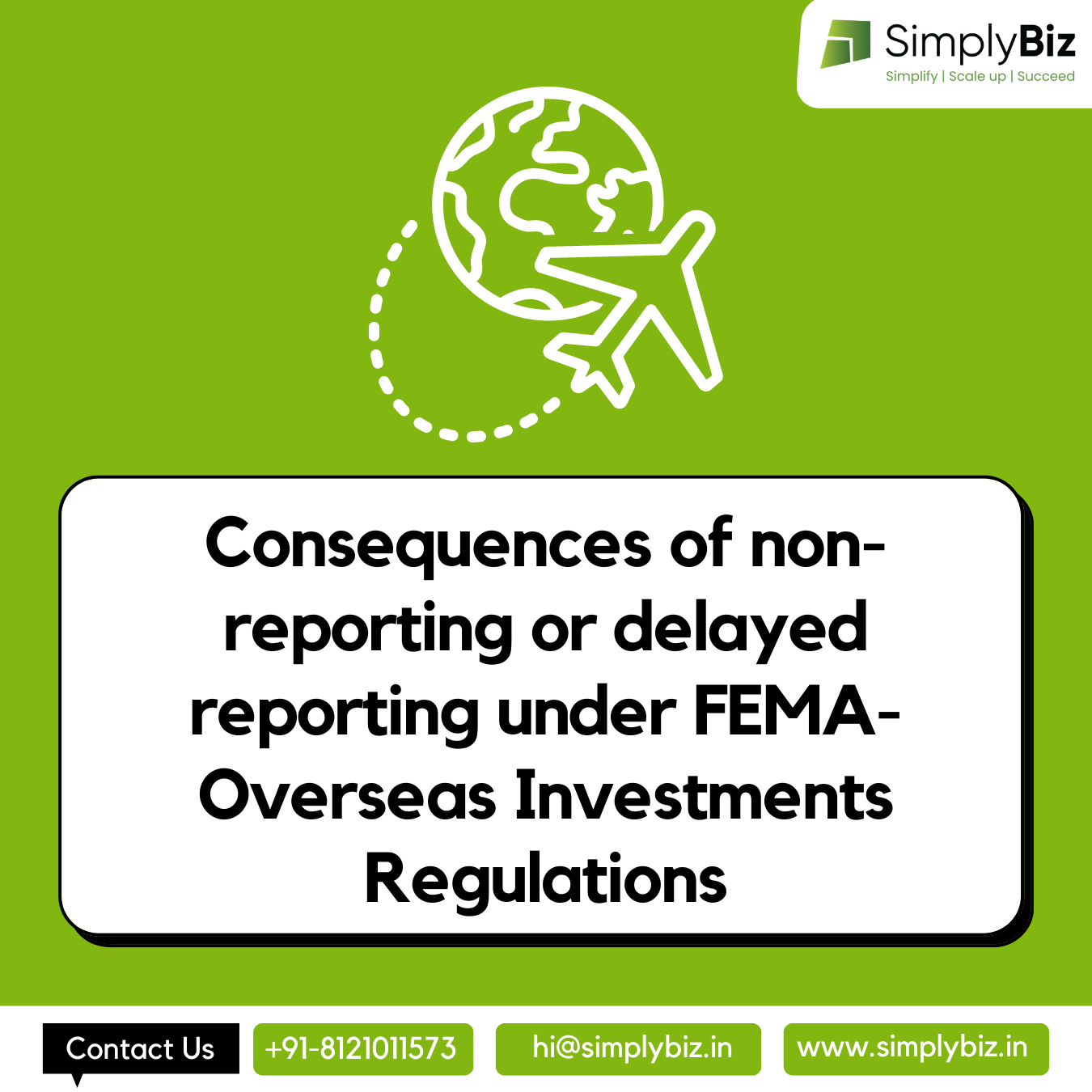Consequences of non-reporting or delayed Reporting under FEMA- Overseas Investments Regulations
Email id: nikita@simplybiz.in
Investments are one of the key elements of wealth creation in India. Due to Globalisation, Overseas Investment has shown a positive trend in the growth and expansion of Business Entities. Overseas Investment has not only handheld Companies to enjoy substantial growth in the business by moving funds towards foreign but also has helped in the advancement of the Indian economy. Though Overseas Investment has been a boon to our economy, if not regulated by the regulating authority, then it can also hamper/ restrict our growth.
Recently, the Reserve Bank of India has notified the new regulations viz., Foreign Exchange Management (Overseas Investment) regulations, 2022 and Foreign Exchange Management (Overseas Investment) rules, 2022 with effect from 22nd August 2022 in supersession of Foreign Exchange Management (Transfer or Issue of Any Foreign Security) Regulations, 2004. The new regime simplifies the existing framework for overseas investment by persons resident in India to cover wider economic activity and significantly reduces the need for seeking specific approvals. This will reduce the compliance burden and associated compliance costs.
Some of the significant changes brought about through the new rules and regulations are summarised below:

(i) enhanced clarity with respect to various definitions;
(ii) introduction of the concept of “strategic sector”;
(iii) dispensing with the requirement of approval for:
- deferred payment of consideration;
- investment/disinvestment by persons resident in India under investigation by any investigative agency/regulatory body;
- issuance of corporate guarantees to or on behalf of second or subsequent level step down subsidiary (SDS);
- write-off on account of disinvestment;
(iv) introduction of “Late Submission Fee (LSF)” for reporting delays.
Companies due to lack of knowledge and negligence unintentionally violate provisions and face consequences from the regulatory authorities. Hence to avoid serious penal provisions we must ensure to be in compliance with all the regulations and rules made thereunder.
Reporting under FEMA (Oversees Investment) Regulations:
Foreign Exchange Management (Oversees Investment) regulations, 2022, and Foreign Exchange Management (Oversees Investment) rules, 2022 provide for reporting requirements, not only annual reporting but also event-based reporting in case of Overseas Investment.
- Event-based Reporting
Form FC: It is required to be submitted to the designated Authorised dealer (AD) bank by the person resident in India seeking to invest in the foreign entity, whether under Automatic Route or Approval Route. Form FC consists of various sections A to G which covers details of the Indian entity/Resident Individual/trust/Society, foreign entity, step-down-subsidiary (SDS), financial commitment, declarations, certificate by statutory auditors, details to be reported at the time of restructuring of the balance sheet of the foreign entity and details to be reported at the time of disinvestment.
The below-mentioned events provide a detailed overview of scenarios when the form FC is to be filed:
- At the time of sending outward remittance or making a financial commitment, whichever is earlier. (Financial commitment refers to an aggregate amount of overseas investment including debt other than Overseas Portfolio Investment and includes the non-fund-based facilities extended by such person to foreign entities.)
- At the time of disinvestment – within thirty days of receipt of disinvestment proceeds.
- At the time of restructuring of foreign entity – within thirty days from the date of such restructuring.
- Acquisition of equity capital on deferred payment basis in accordance with the OI regulations – at the time of payment of part of the consideration and considering the deferred payment as non-fund based commitment.
- Subsequent remittance towards the payment of deferred consideration shall be reported as conversion of non-fund based commitment to equity capital.
- Non-fund based commitment [viz., issue of corporate or personal guarantee, performance guarantee, bank guarantee etc.,
- Any subsequent change in date of undertaking of financial commitment or validity date.
- Any roll over of a guarantee
- In case more than one person resident in India is investing in same foreign entity, Form FC shall be submitted individually by all such investing persons to the designated branch of AD bank.
- For capitalisation of export proceeds and incorporation expenses or the other dues viz., royalty, technical know-how fee, consultancy fees, etc.
- In case of any financial commitment as a merger of foreign entity or step-down subsidiary.
- In case of any financial commitment as a sale, transfer. Merger by Indian entities or group companies.
- In case of creation of pledge or creation of charge on assets of the foreign entity or SDS
- Annual Reporting
Form APR : Person resident in India acquiring capital in foreign entity which is reckoned as Overseas Investment (OI) shall submit Annual Performance Report (APR) with respect to each foreign entity where investment is made every year by 31st December.
- Form APR shall be filled in based on audited financials statements of foreign entity. In case there is no mandatory requirement of audit in the host country, the same can be filed based on unaudited financial statements duly certified by statutory auditors of Indian entity.
- Form APR shall contain information regarding acquisition, setting up, winding up, transfer of a step-down subsidiary or alteration in the shareholding pattern in the foreign entity during the reporting year.
Form FLA: Indian entity which has made ODI shall submit Annual return on Foreign Liabilities and Assets (FLA) for every financial year ended 31st March, on or before 15th July every year.
Consequences of non-reporting’s as per FEMA regulations:
The Indian entity/resident individual must undertake reporting’ by submitting the relevant Form FC/APR/FLA within the timelines specified for the transactions mentioned above. Instances where there are delays, RBI allows the Indian entities to undertake delayed reporting as the case may be within 3 years of such transaction by payment of late submission. Beyond this delay, RBI would direct the Indian Entity to make an application for Compounding.
| Sr. No. | Type of Reporting delays | Late Submission Fees Amount (INR) |
| 1 | Form ODI Part-II/ APR, FCGPR (B), FLA Returns, Form OPI, evidence of investment or any other return which does not capture flows or any other periodical reporting | 7500 |
| 2 | FC-GPR, FCTRS, Form ESOP, Form LLP(I), Form LLP(II), Form CN, Form DI, Form InVi, Form ODI-Part I, Form ODI-Part III, Form FC, Form ECB, Form ECB-2, Revised Form ECB or any other return which captures flows or returns which capture reporting of non-fund transactions or any other transactional reporting | [7500 + (0.025% × A × n)] |
*Notes:
a) “n” is the number of years of delay in submission rounded-upwards to the nearest month and expressed up to 2 decimal points.
b) “A” is the amount involved in the delayed reporting.
Entities must ensure to be in compliance with these regulations and if there are any un-intended non-compliances, it is advisable to take the route of Suo-moto compounding.
For more details please reach out to our product head at vaishali@simplybiz.in or simplycorp@simplybiz.in if you are facing similar challenge. We will be happy to help you.
Disclaimer:
The content of this document has been developed based on relevant information and are purely for private circulation. Though the authors have made utmost efforts to provide authentic information, however, the authors expressly disclaim all and any liability to any person who has read this document, or otherwise, in respect of anything, and consequences of anything done or omitted to be done by any such person in reliance upon the contents of this document.


Leave A Comment